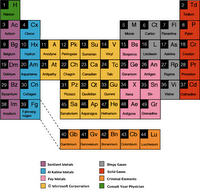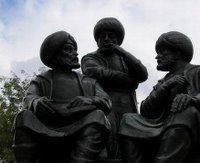The Blogging Dooyeweerdiansor "blogosphere sovereignty"?
My friend, Scott Kennedy, is utilizing Dooyeweerdian modal aspects to
tag his blog posts. I think this is totally fantastic. I don't use tags myself, and such an application would probably never have occurred to me. But I hope his endeavor is a success and that others try it out.
Modalities (or aspects) are highly abstract "categories." They are fundamentally
hows or ways (not
whats or things). They are the "hows" of meaning. Created reality, all existence, is meaning. Things don't have meaning, they
are meaning. That sounds strange, but it means that, as created, the being of this universe is utterly dependent on its Creator. Being is meaning because it both refers to God and expresses His power. The modalities are theoretically irreducible "modes" of temporal being and experience, that is to say "of the way reality means."
Now, as the highly abstract categories that they are, modalities may not seem to be the best "taxonomy" for blog post tagging. Most topics discussed in any given blog entry cover a wide range of interconnections, or what might be called "modal analogies." But even these sorts of analogical concepts are still quite abstract. Many things one would talk about in a blog are the concrete things of "every day" experience. One might talk about a vacation trip, and the paintings viewed in a museum, and the friends who came with, and the foods tasted, and so on. One might even talk about the paper one's writing. But these are all concrete things, not abstractions.
However, each of these concrete things may be associated with some "primary characteristic" or other. And such primary characteristics, however discerned, can be associated with some particular related modality. Blog topics classification is not a theoretically precise science, and there's no reason it should be. But the possibility of relating such topics to Dooyeweerd's profound theoretical matrix seems to hold promise of providing a
diverse-enough-to-be-flexible, yet
concise-enough-to-be-systematic solution for blog metadata. Who woulda thunk it?
Anyway, let me take this opportunity to list the several Reformational (aka Dooyeweerdian) and/or Neocalvinist (aka Kuyperian) active bloggers from my sidebar. In part, I mention these blogs to find out
who else I can include. So, if I've left you out, let me know!
Macht BeheersingMark BertrandNathan BiermaSteve BishopByron BorgerJoe CarterJeff CavanaughSander ChanNevada EpiginoskeinCal FoxBill Gram-ReeferRudi Hayward (
new blogger!)
Dave HegemanAndrea HensenKenn HermannBen HouseBrian JanaszekDavid KoyzisKeith MartelCynthia NielsenPaul OttoNancy PearceyThe PhilologousTheo PlantingaRuss ReevesOwl RefwritePaul RobinsonJamie SmithGideon StraussSteve VeldkampGreg VeltmanGraham WeeksAgain, if I mistakenly left you out (and you've posted in the past month or so), or if you're only a neocalvinist in my dreams (I mistakenly included you), be sure to leave me a comment and I'll correct the list.
 My article, entitled Dooyeweerd's Societal Sphere Sovereignty: a theory of differentiated responsibility, is now available at the Peace Palace library here. It is also available online in pdf HERE, from the June 2006 Griffin's View International and Comparative Law Journal site. It is a revision of the short paper I wrote this year.
My article, entitled Dooyeweerd's Societal Sphere Sovereignty: a theory of differentiated responsibility, is now available at the Peace Palace library here. It is also available online in pdf HERE, from the June 2006 Griffin's View International and Comparative Law Journal site. It is a revision of the short paper I wrote this year.






